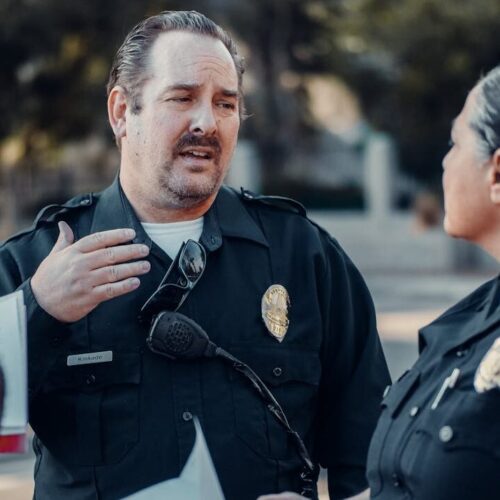Congressional Staff Briefed on Law Enforcement Responses to People with Mental Illnesses
Washington, D.C. — Law enforcement officials, judicial leaders, and behavioral health experts came together on March 6 to brief Congressional staff on the Mentally Ill Offender Treatment and Crime Reduction Act (MIOTCRA) and the collaborative criminal justice-mental health programs that it supports. Dr. Fred Osher of the Council of State Governments Justice Center, Chief J. Thomas Manger of the Montgomery County (MD) Department of Police, Inspector Bryan Schafer of the Minneapolis (MN) Police Department, and Judge Steven Leifman of Miami-Dade County Court spoke to key stakeholders and staff from numerous congressional offices, representing members of both parties.
As some of the nation’s foremost experts on implementing collaborative criminal justice-mental health programs, the panelists each shared their perspectives and/or experiences. Their testimonies underscored the fact that programs supported by MIOTCRA and similar grant initiatives are contributing in significant ways towards ending the cycles of arrest and incarceration for people with mental illnesses.
Dr. Osher opened the dialogue with an overview of the issue. He addressed major factors involved in the high rates of incarceration among people with mental illnesses, including limited access to community-based treatment and high rates of homelessness and substance abuse. Dr. Osher then highlighted the initiatives that MIOTCRA funds through its Justice and Mental Health Collaboration Program to bridge the gaps across service systems. In addition to community- and corrections-based treatment programs, MIOTCRA has also supported jurisdictions across the U.S. developing or expanding programs such as mental health courts, crisis receiving centers, and specialized law enforcement responses such as crisis intervention teams (CITs).
Chief Manger and Inspector Schafer offered their perspectives on implementing specialized police-based response programs. Modeled after the widely recognized model in Memphis, TN, the Montgomery County CIT program provides officers 40 hours of training to help them better identify mental illnesses and deploy de-escalation tactics. Chief Manger spoke to the benefits he has seen from the CIT program, in public and police safety and in outcomes for people with mental illnesses.
Inspector Schafer emphasized the importance of programs that encourage information sharing between mental health and law enforcement agencies, which often do not have a clear understanding of how the other system handles and treats people with mental illnesses after the initial contact has been made. Creating connections across systems is a crucial component of MIOTCRA’s grant program, as they allow agencies to share resources and improve the quality and access to services. Inspector Schafer reported that leaders in Minneapolis are also planning crisis receiving centers and a program that pairs mental health professionals to co-respond to calls with local law enforcement officials, modeled after a similar program already in place for calls relating to domestic violence.
Judge Leifman from Miami-Dade County, FL, which has one of the highest rates of mental illness of any urban region in the U.S., provided his unique insight into how collaborative programs that divert individuals from arrest or jail can reduce local government spending. To address the prevalence of people with mental illnesses involved in the justice system, Miami-Dade county officials expanded its jail diversion program to include a CIT program and post-arrest diversion for both misdemeanor and felony charges. According to Judge Leifman, the diversion programs today redirect approximately 500 individuals each year from jail to treatment services. The CIT program — now the largest in the country — has trained over 3,500 officers to date. The impact of this training initiative has been astounding: As Judge Leifman testified, two of the county’s law enforcement departments responded to 10,000 calls involving an individual with a mental illness last year, yet only 45 arrests resulted from these calls. Furthermore, the judge discussed how prior to the implementation of the CIT program, the county experienced eight to ten shootings during encounters between officers and individuals with mental illnesses per year; in the past eight years, there have been only such two instances.
The briefing was co-hosted by the offices of Senators Roy Blunt (R-MO), Chris Coons (D-DE), and Al Franken (D-MN). The Council of State Governments Justice Center co-sponsored the event with the National Alliance on Mental Illness, the Bazelon Center for Mental Health Law, the National Association of Counties, and Mental Health America.
As some of the nation’s foremost experts on implementing collaborative criminal justice-mental health programs, the panelists each shared their perspectives and/or experiences. Their testimonies underscored the fact that programs supported by MIOTCRA and similar grant initiatives are contributing in significant ways towards ending the cycles of arrest and incarceration for people with mental illnesses.
" title="Tweet this" OnClick="window.open(this.href,'targetWindow','toolbar=no,location=0,status=no,menubar=no,scrollbars=yes,resizable=yes,width=626,height=436'); return false;" data-share="social">The sharp rise in school shootings over the past 25 years has led school officials across the U.S.…
Read MoreA three-digit crisis line, 988, launched two years ago to supplement—not necessarily replace—911. Calling 988 simplifies access to…
Read MoreIt would hardly be controversial to expect an ambulance to arrive if someone called 911 for a physical…
Read More Taking the HEAT Out of Campus Crises: A Proactive Approach to College Safety
Taking the HEAT Out of Campus Crises: A Proactive Approach to College Safety
The sharp rise in school shootings over the past 25 years has…
Read More From 911 to 988: Salt Lake City’s Innovative Dispatch Diversion Program Gives More Crisis Options
From 911 to 988: Salt Lake City’s Innovative Dispatch Diversion Program Gives More Crisis Options
A three-digit crisis line, 988, launched two years ago to supplement—not necessarily…
Read More Matching Care to Need: 5 Facts on How to Improve Behavioral Health Crisis Response
Matching Care to Need: 5 Facts on How to Improve Behavioral Health Crisis Response
It would hardly be controversial to expect an ambulance to arrive if…
Read More Finding Solutions to Complex Criminal Justice Issues: Q&A with New CSG Justice Center Advisory Board Member Justice Briana Zamora
Finding Solutions to Complex Criminal Justice Issues: Q&A with New CSG Justice Center Advisory Board Member Justice Briana Zamora
The CSG Justice Center Advisory Board establishes the policy and project priorities…
Read More











